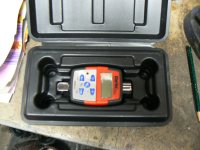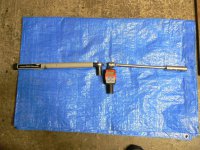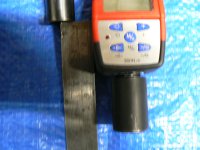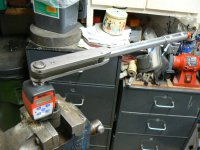I posted, a wee while ago, about my experiences with Brake pipe flaring tools: https://www.seatcupra.net/forums/threads/brake-pipe-flaring-tools.466163/#post-5032196 and a couple of people made interesting replies. In particular EduardoHope01 who said he particularly enjoyed this type of post. I wouldn't be surprised to find many of us have messed about with cheaper flaring tools and maybe caught a bt of a cold buying poor quality items? So, thinking further on this I thought I could do a similar "feature on Torque wrenches which is another tool many aspire to own and where you should never buy the "cheap and cheerful" option.
So, hopefully some may find this interesting and I'd love to hear of other's experiences.
Many years ago, whilst a student learning my trade - motor Mechanic - as my abilities grew, I needed to do a cylinder head on my MIni (burnt exhaust valve - due no doubt to me mercilessly ragging it around the country roads!) My local factor had a special offer on this one:
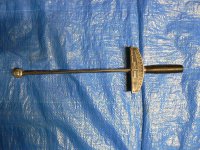
and, being no expert, and with very little money available, I bought it. Seemed to work Ok, had a range of 0 to 150 lbs/ft and the gasket never blew for the rest of the time I owned it so it must have been good enough for the old cast iron 850 mini engine. Wouldn't trust it on one of today's aluminium wonders though!
Some years later, now a City and Guilds qualified mechanic, I found myself getting involved in more ambitious home projects. With much more knowledge of my trade now I realized that old torque wrench was probably not really very precise and, with it being difficult to borrow tools like torque wrenches, from work I decided to buy a really good one so bought this:
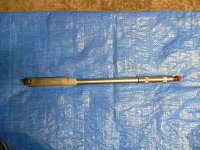
Not cheap, but pretty much the industry standard at that time and found in most garages. Scale 20 to 100 lbs/ft (25 to 135 Nm).
This has been an excellent purchase and I've used it on engine and transmission rebuilds, a couple of modified engine builds - notably a big bore VW which went into a beach buggy and my 1275 "S" engine which I built to "fast road" spec also a complete strip down and rebuild of both engine ("O" series) and gearbox in my old Ambassador and many other lesser projects. A number of years ago I had it - the wrench - overhauled and recalibrated and the company which did it said that it needed very little "tweeking" to bring it right up to spec. Not a cheap job though, having a torque wrench recalibrated by a reliable engineering company and that's worth remembering because torque wrenches really need to be checked and recalibrated on a regular basis. This factor is all part of this thread ongoing - so read on.
Next, and we're still talking many years ago at this point, I was at the Portobello autojumble which was held in the town hall. I've made a number of very good purchases there and on this occasion I spotted a whopper of a torque wrench. I just couldn't resist it. Here it is with the old beam wrench next to it for comparison:
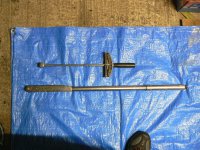
It's rated 50 to 250 lbs/ft (70 to 340 Nm) and I convinced myself I needed it. To do what? I've no idea, but I just fancied it and it was quite cheap - probably because he'd had it "for ever" and couldn't move it on, I guess not many "driveway grease monkeys" need one this big? Anyway I actually can't remember ever using it, but it looked very impressive on my back wall tool board! Then, one day, a chap I know quite well, asked to borrow it. I don't usually lend tools and especially not precision tools, but this chap is very kindly disposed towards me and a useful chap to know what with his trade connections etc, so I let him take it. Some time later he returned it but with the spring still compressed to a scale reading of around 235 lbs/ft. Wonder what he'd been working on? must have been a commercial? Anyway, I was very disappointed at this because anyone "who knows" knows you always wind the tension off the spring in a torque wrench otherwise it rapidly becomes inaccurate. So I wound the handle back and, the whole thing came apart!:
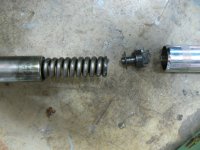
You can see the spring and calibration washer and this set me to wondering how this might have happened, because normally these things stop once the spring is backed off. Well, looking at the handle more closely you can see a wee hole in the side of the main body, which obviously should have some sort of stop in it and this is missing:
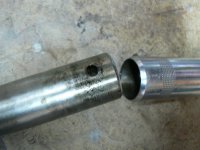
Of course then I went on to wonder why? and I then thought, I bet this isn't the first time this has happened and if so, maybe calibrating washers have been lost etc. So that was why it was so "affordable" At the very least this tool needs a specialist looking at it and recommending whether it's worth going further to restore it - and that's going to cost. So it went back to being an ornament on my tool board.
The years rolled on and I'd become quite friendly with the chap who manages the tool desk in our local Halfords. One of the things about the very good and high quality smaller Britool wrench (the one with the red "bobble" in the second illustration) is that it doesn't have a ratcheting action which can make it quite difficult to use in some enclosed and tight situations, especially if you're using a single hex socket with it. He alerted me to a special offer they were doing at that time, on a Norbar with ratchet built in, which actually worked out even cheaper with my trade card, on a similar range - 20 to 110 lbs/ft (30 to 150 nm). I "treated" myself and I'd strongly recommend a ratcheting wrench if you are buying one.
For a number of years that was it for me with torque wrenches. Until, maybe 10 years ago when I thought "I wonder if the Norbar, which was my "go to" option, is still accurate? Then I thought, I've hardly used the Britool since it was calibrated so i could probably check the Norbar against it? So I set them both to the same mid range setting, popped the square drive out of the Norbar and slid it over the Britool's square drive:
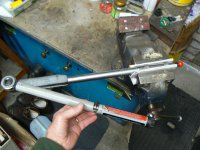
Then, with the Britool held in the vice, I pulled on the Norbar's handle and both wrenches clicked almost simultaneously. Excellent! I tried it a couple of times with the result repeating. Then I tried them at a quarter full scale and three quarters full scale - bearing in mind these types of wrench are not especially accurate at near zero or full scale, and again, they clicked off almost simultaneously. With the Britool having hardly seen the light of day since calibration I recon that proves the Norbar probably isn't far out?
Going to have to split this post - it's too long for it to be accepted. I'll make another post to complete it
So, hopefully some may find this interesting and I'd love to hear of other's experiences.
Many years ago, whilst a student learning my trade - motor Mechanic - as my abilities grew, I needed to do a cylinder head on my MIni (burnt exhaust valve - due no doubt to me mercilessly ragging it around the country roads!) My local factor had a special offer on this one:

and, being no expert, and with very little money available, I bought it. Seemed to work Ok, had a range of 0 to 150 lbs/ft and the gasket never blew for the rest of the time I owned it so it must have been good enough for the old cast iron 850 mini engine. Wouldn't trust it on one of today's aluminium wonders though!
Some years later, now a City and Guilds qualified mechanic, I found myself getting involved in more ambitious home projects. With much more knowledge of my trade now I realized that old torque wrench was probably not really very precise and, with it being difficult to borrow tools like torque wrenches, from work I decided to buy a really good one so bought this:

Not cheap, but pretty much the industry standard at that time and found in most garages. Scale 20 to 100 lbs/ft (25 to 135 Nm).
This has been an excellent purchase and I've used it on engine and transmission rebuilds, a couple of modified engine builds - notably a big bore VW which went into a beach buggy and my 1275 "S" engine which I built to "fast road" spec also a complete strip down and rebuild of both engine ("O" series) and gearbox in my old Ambassador and many other lesser projects. A number of years ago I had it - the wrench - overhauled and recalibrated and the company which did it said that it needed very little "tweeking" to bring it right up to spec. Not a cheap job though, having a torque wrench recalibrated by a reliable engineering company and that's worth remembering because torque wrenches really need to be checked and recalibrated on a regular basis. This factor is all part of this thread ongoing - so read on.
Next, and we're still talking many years ago at this point, I was at the Portobello autojumble which was held in the town hall. I've made a number of very good purchases there and on this occasion I spotted a whopper of a torque wrench. I just couldn't resist it. Here it is with the old beam wrench next to it for comparison:

It's rated 50 to 250 lbs/ft (70 to 340 Nm) and I convinced myself I needed it. To do what? I've no idea, but I just fancied it and it was quite cheap - probably because he'd had it "for ever" and couldn't move it on, I guess not many "driveway grease monkeys" need one this big? Anyway I actually can't remember ever using it, but it looked very impressive on my back wall tool board! Then, one day, a chap I know quite well, asked to borrow it. I don't usually lend tools and especially not precision tools, but this chap is very kindly disposed towards me and a useful chap to know what with his trade connections etc, so I let him take it. Some time later he returned it but with the spring still compressed to a scale reading of around 235 lbs/ft. Wonder what he'd been working on? must have been a commercial? Anyway, I was very disappointed at this because anyone "who knows" knows you always wind the tension off the spring in a torque wrench otherwise it rapidly becomes inaccurate. So I wound the handle back and, the whole thing came apart!:

You can see the spring and calibration washer and this set me to wondering how this might have happened, because normally these things stop once the spring is backed off. Well, looking at the handle more closely you can see a wee hole in the side of the main body, which obviously should have some sort of stop in it and this is missing:

Of course then I went on to wonder why? and I then thought, I bet this isn't the first time this has happened and if so, maybe calibrating washers have been lost etc. So that was why it was so "affordable" At the very least this tool needs a specialist looking at it and recommending whether it's worth going further to restore it - and that's going to cost. So it went back to being an ornament on my tool board.
The years rolled on and I'd become quite friendly with the chap who manages the tool desk in our local Halfords. One of the things about the very good and high quality smaller Britool wrench (the one with the red "bobble" in the second illustration) is that it doesn't have a ratcheting action which can make it quite difficult to use in some enclosed and tight situations, especially if you're using a single hex socket with it. He alerted me to a special offer they were doing at that time, on a Norbar with ratchet built in, which actually worked out even cheaper with my trade card, on a similar range - 20 to 110 lbs/ft (30 to 150 nm). I "treated" myself and I'd strongly recommend a ratcheting wrench if you are buying one.
For a number of years that was it for me with torque wrenches. Until, maybe 10 years ago when I thought "I wonder if the Norbar, which was my "go to" option, is still accurate? Then I thought, I've hardly used the Britool since it was calibrated so i could probably check the Norbar against it? So I set them both to the same mid range setting, popped the square drive out of the Norbar and slid it over the Britool's square drive:

Then, with the Britool held in the vice, I pulled on the Norbar's handle and both wrenches clicked almost simultaneously. Excellent! I tried it a couple of times with the result repeating. Then I tried them at a quarter full scale and three quarters full scale - bearing in mind these types of wrench are not especially accurate at near zero or full scale, and again, they clicked off almost simultaneously. With the Britool having hardly seen the light of day since calibration I recon that proves the Norbar probably isn't far out?
Going to have to split this post - it's too long for it to be accepted. I'll make another post to complete it


